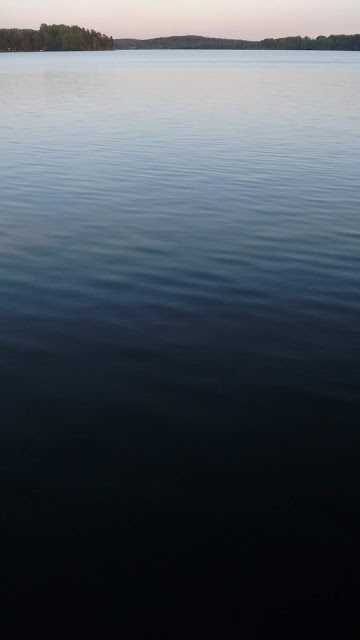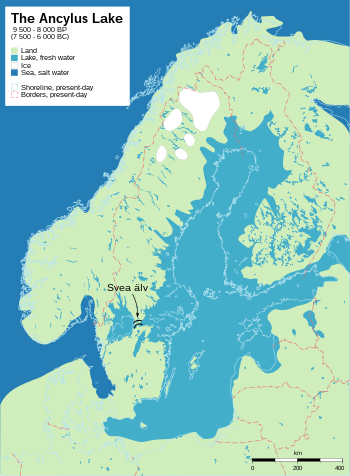So far as the British are concerned 'Last of The Summer Wine' probably 'did for' Nora having any other connotation than 'wrinkled stockings', well, at least for the over the over fifties. In Sweden it means wooden houses, ice cream, lakeside walks and steam trains according to our Lonely Planet guide. After two niggling days by Lake Skagern, with a brighter day forecast, we decided to visit Nora and see if it lived up to the positive spin.
First we needed to top up with LPG. Arrangements differ from country to country as does the adaptor required. Denmark appeared to have only three places in the whole of Jutland with a pump, we visited two and one worked. Sweden has many more, but not on forecourts. You need to go to a specialist propane gas supplier. We had not reckoned on a queue, but gas is sold mainly in refillable bottles, similar to our Safefill, and is used not just in motorhomes but caravans, boats. BBQs, and patio heaters.
We had to wait our turn. No self-fill here. The guy at the pump had no problem connecting us up - Sweden uses the same 'cup' adapter as France. He was less happy with the way our refillable cylinder had been fitted, claiming that it should meet the regulations governing under-slung tanks and have metal not rubber pipework. The problem is every single EU country have slightly different practises and each one is convinced theirs is the definitive European standard. Pump guy turned a blind eye to our alleged transgression and topped us up anyway. Expensive, at 11.50SEK per litre (£0.95) the most we have ever paid.
 |
| LPGill |
So, how did Nora score so far as the Lonely Planet hype went? Taking its promised charms one by one:
1. Wooden Houses
It is true, the town centre abounds with pretty wooden houses, some rust red, others pastel shaded - cream or pale mint green. The stuccoed white church by Swedish standards was quite imposing, on the whole the Lutheran churches in villages and towns tend to be quietly understated as you
The town would get full marks for cute traditional buildings but for a couple of spectacularly unlovely concrete public housing blocks plonked in the middle. Why i post-war 'welfare state' architecture so dull, ugly and ill-proportioned right across Europe, on both sides of the 'Iron Curtain', in countries directly involved in WW2 and neutral states too?
Score 9/10.
2. Ice Cream
Our guidebook gushes about the wonders of 'Nora Glass', purveyors of scrumptious ice cream to townsfolk since 1923. Be ready to queue, warned Lonely Planet. In this respect they were correct, two orderly queues had formed at the windows. Being Sweden a stepped stool had been provided so children could peer over the counter as their ice-cream delight was prepared. Most became so excited at the prospect they almost fell off.
We chose the hazelnut rather than the grapefruit flavour. Rather than have dozens of flavours on offer the place has a rolling menu of daily 'specials. It clearly had become a local institution, public seating had been provided for customers and it has acquired a resident flock of opportunist jackdaws on hand to devour drips and spillages
It is good freshly made ice cream, but given the months we have spent in Italy then we have become difficult to please. Score - because we have become gelato snobs - 8/10
3. Lakeside walks
Nora's setting as well as its architecture makes it special. Sweden's smaller lakes epitomise the truth of Auden's lines in his eponymous poem:
A lake allows an average father, walking slowly, / To circumvent it in an afternoon, / And any healthy mother to halloo the children / Back to her bedtime from their games across: / (Anything bigger than that, like Michigan or Baikal, / Though potable, is an 'estranging sea').
The small town on low rising ground by the lake which is little bigger than a tarn is a beautiful spot. The lake itself has a large island in the middle which has been developed as a visitor attraction with children's activities.
Sometime after sunset we took a walk back to the lake. Standing at the end of a small pier the water directly beneath me was profoundly dark, slowly lightening through shades of silvery blue towards the low hills on the opposite shore - a moment of utter tranquillity.
Utter? Perhaps a slight overstatement, 'intermittent tranquility' is more accurate. Pointlessly circling the town with the determined boredom only older adolescents can muster, a lone youth shattered the peaceful twilight on a miniature scooter with an underpowered motor that sounded like a chainsaw when driven faster than about 20mph. He would shriek past us then disappear into the twilight becoming a distant annoying buzz in the background as he disturbed the peace of other neighbourhoods. After five minutes of relative peace he would returned to annoy us some more, the pattern repeating itself until about 10 o'clock when hunger, or fear of his mother drove him home.
So how should we score Nora's lacrustine delights? Surely we have to award full marks, it's hardly the lake's fault that the place has irritating adolescents - 10/10.
4. Steam Trains
The moho parking is right next to Nora's old railway sidings. The town is Sweden's Darlington, the birthplace of the national railway network, the place where in the 1850s the tracks connecting local mining villages adopted a standard gauge and a few a years later launched the first regular passengers services.
The mines are long gone and Nora's station was closed in the 1980s, at least so far as the national network was concerned. Since then the station and workshops have been run by volunteers and they have developed an impressive museum commemorating both Nora's railway heritage and the history of the nearby mining villages.
For a boy born in the mid 1950s who never quite acquired the Hornby train set he hankered after and the girl who grew up the the heartland of the Durham mining industry - it's got to be 10/10.


























































